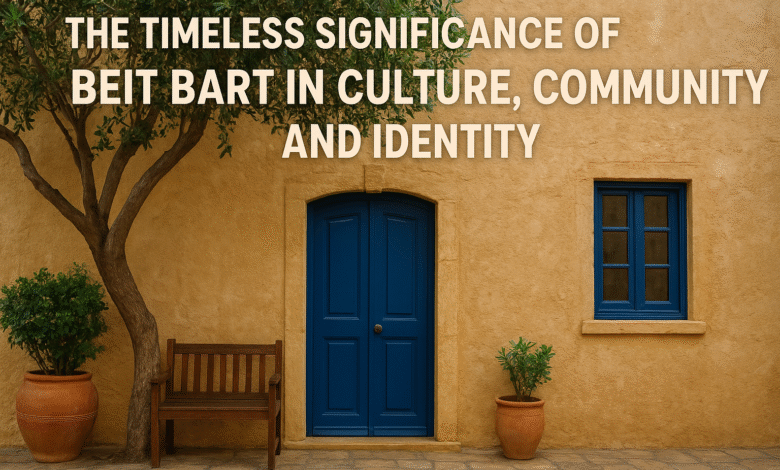The Timeless Significance of Beit Bart in Culture, Community, and Identity

The concept of Beit Bart carries layers of cultural, social, and symbolic meaning. The word “Beit,” in many languages of the Middle East and Mediterranean, translates to “house” or “home.” Meanwhile, “Bart” is often a family name or an identifying word tied to personal, historical, or cultural heritage. When combined, Beit Bart becomes more than just a literal house—it is a powerful representation of identity, belonging, and tradition.
In today’s rapidly evolving world, people yearn for connections that feel authentic. They search for places, names, and concepts that remind them of home, ancestry, and shared values. Beit Bart is one such expression that resonates deeply because it embodies both the intimacy of family and the universality of culture.
The Historical Roots of Beit Bart
To understand the significance of Beit Bart, it is essential to look into its historical context. Across many ancient civilizations, the idea of a “Beit” or home was the center of life. Homes were not merely places to live but spaces that safeguarded traditions, hosted celebrations, and preserved wisdom passed down through generations.
The addition of “Bart” suggests an identity connected to people, lineage, or cultural distinctiveness. It could represent a family’s proud heritage or even a symbolic guardian of stories and values. Historically, spaces like Beit Bart were gathering spots where communities united to share meals, exchange knowledge, and foster mutual respect.
Beit Bart as a Cultural Symbol
Over time, Beit Bart has evolved into more than a name—it has become a cultural symbol. Across different societies, such a concept highlights important aspects of human experience:
-
Food and Cuisine: Beit Bart often symbolizes traditional cooking and shared meals. Food is not just sustenance here—it is an expression of identity. Passing down recipes and cooking methods in a place like Beit Bart ensures the survival of cultural flavors.
-
Hospitality: Many cultures define a home not just by the family within it, but also by how it welcomes outsiders. Beit Bart represents hospitality, where every guest is treated as family.
-
Music and Storytelling: Homes like Beit Bart serve as venues for storytelling, music, and oral traditions. They keep alive the songs, tales, and legends that define a community’s soul.
This makes Beit Bart a living archive of culture. Every interaction within its walls contributes to the preservation of history and the celebration of identity.
The Modern Relevance of Beit Bart
In today’s globalized world, where mobility often uproots individuals from their traditions, Beit Bart becomes more relevant than ever. People living abroad or moving into new societies often crave spaces that reconnect them with their heritage.
Many modern cultural centers, restaurants, and community projects are inspired by the Beit Bart concept. They recreate a home-like atmosphere where people from different backgrounds can gather, share experiences, and celebrate diversity. Such initiatives remind us that while societies evolve, the need for belonging and shared roots never disappears.
Moreover, in the age of digital platforms, even online communities reflect the essence of Beit Bart. Forums, social networks, and creative spaces that foster meaningful connection can be seen as virtual Beit Barts—modern homes for dialogue and expression.
Beit Bart as a Metaphor for Belonging
Perhaps the greatest power of Beit Bart lies in its metaphorical significance. Beyond a physical place, it symbolizes belonging, safety, and cultural identity. For many, the name conjures images of warmth, family, and shared heritage.
Belonging is a universal human need. In times of displacement, uncertainty, or change, people naturally seek an anchor. Beit Bart represents this anchor—it assures individuals that no matter where they are, they have a cultural and emotional home to return to.
The Role of Beit Bart in Community Building
Community thrives where people feel connected, and Beit Bart often serves as a foundation for such unity. It acts as a hub where people come together to celebrate festivals, engage in discussions, and support each other in times of difficulty.
-
Social Gatherings: Beit Bart often hosts events that strengthen social ties.
-
Cultural Education: It becomes a place where younger generations learn traditions, language, and values.
-
Collective Identity: Through shared experiences, Beit Bart reinforces a sense of collective belonging.
By fostering inclusivity, Beit Bart ensures that traditions do not fade away but adapt to the present while honoring the past.
The Symbolic Role of Beit Bart in Literature and Arts
Throughout history, literature and art have used the concept of home as a metaphor for identity, roots, and memory. Beit Bart naturally aligns with these artistic themes. Writers often portray such homes as symbols of continuity, while artists may represent them as spaces of nostalgia and resilience.
In poetry, the home often reflects longing and belonging. In painting, it becomes a motif of warmth and permanence. Similarly, in modern storytelling, Beit Bart can symbolize both personal journeys and collective memory.
Why Beit Bart Matters in the Global Age
As the world becomes increasingly interconnected, identities are also becoming more fluid. Yet, the importance of grounding oneself in tradition has never been greater. Beit Bart provides this grounding. It reminds people of where they come from, what values they carry, and how they can contribute to the global community without losing their individuality.
Beit Bart matters because it keeps the human experience authentic. It shows that even in a fast-moving digital age, people still value tradition, hospitality, and connection.
The Future of Beit Bart
Looking forward, the concept of Beit Bart is likely to expand even further. From physical community centers to cultural movements and online platforms, its meaning will continue to evolve. However, its essence will remain unchanged—it will always represent home, belonging, and cultural preservation.
Younger generations are particularly drawn to experiences that blend tradition with innovation. As such, Beit Bart may become a powerful symbol of how communities can embrace progress while holding onto their roots.
Read also: The Complete Guide to fivebpeol: Meaning, Uses, and Digital Impact
Conclusion
Beit Bart is more than a simple phrase. It is a living concept that reflects the universal human desire for home, identity, and connection. Rooted in history and enriched by culture, it carries meaning that resonates across generations.
In a world where traditions risk being overshadowed by modern lifestyles, Beit Bart stands as a reminder of the power of belonging. It tells us that while places and people may change, the essence of home—the warmth, the values, and the sense of togetherness—remains timeless.



